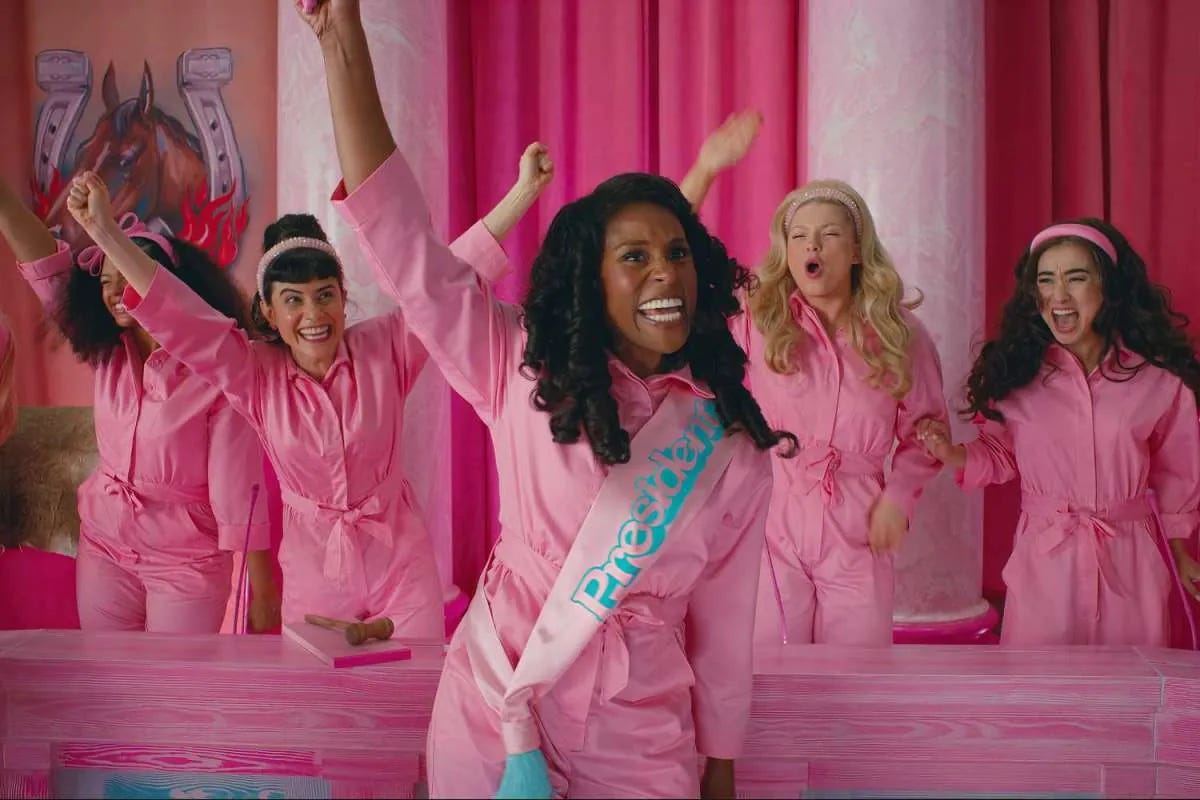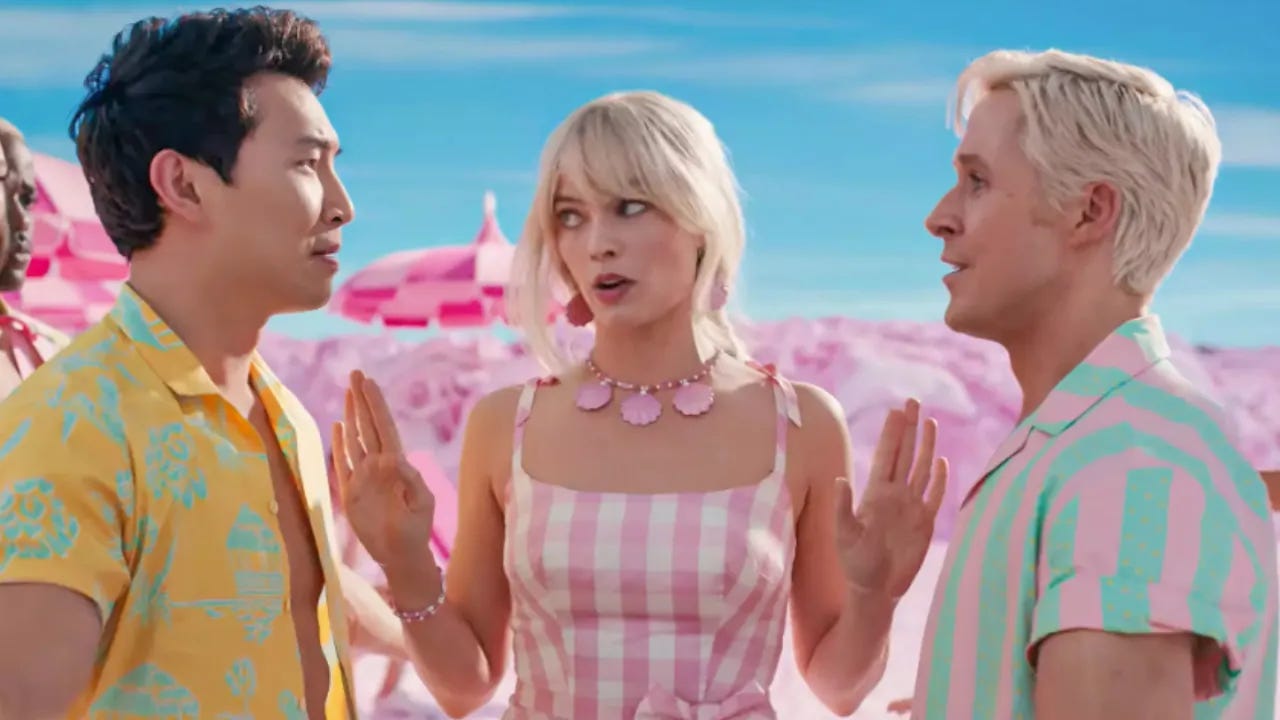An open letter to guys complaining about the Barbie movie.
We're not laughing at you. Okay, we are. But mostly we're laughing at ourselves.
Barbie: The Movie is not a movie about feminism.
Barbie: The Movie is not a movie about emasculating men.
Barbie: the Movie is a movie about… (wait for it…)
Barbie.
Or more specifically, what Barbie—the brand, the doll, the marketing phenomenon—has or hasn’t meant to millions of women, for better or for worse, throughout our entire lives, and how it’s evolved over time.
So, men. Fellows. My dudes.
Just for a quick moment, try thinking about our long and complex relationship with Barbie if you want to understand why Barbie: The Movie is a damn phenomenon.
See, Barbie and women, we have history together that goes back a long ways. Even longer than your history with Fast & Furious or Flamin’ Hot Cheetos.
If you’re a guy (let’s just say a cis hetero guy for clarity) there is a solid likelihood that you never examined Barbie’s tiny waist, those round boobs, that barely-there ski jump nose, that stick-straight blonde hair, and grappled with whether you would ever look like that—or if you were wrong for wanting to. Or not wanting to. Or even thinking about it in the first place.
You never stared at Barbie’s impossibly tiny arched feet and concluded that the real entry to womanhood isn’t menstruation, but the ability to wear stiletto heels with a swimsuit.
Barbie probably never inspired fascinating discussions with your middle-school friends, in which you learned you all fit into one of three archetypes:
the “accessorize my Barbie up the whazoo” kid
the “dye my Barbie’s hair green and giver her a Sharpie mustache” kid
the “my mom wouldn’t let me play with Barbies” kid.
I don’t imagine that years later, you had some feelings on learning that there was now a Barbie who actually looked like you—she was bigger or shorter or curvier or had darker skin, she wore her hair in an African head wrap, or had vitiligo or billions of freckles, or held the very job you’d had for years, or used a wheelchair for mobility.
Speaking of jobs, you certainly didn’t need Barbie back in the 60s or 70s or 80s to help remind you as a tiny child that you could accomplish something greater and more personally satisfying than the eradication of ring around the collar; there were plenty of men like that already on TV and in the movies and in real life, and you never heard them referred to as “men astronauts” or “male lawyers” either.

In fact, you may not have noticed Barbie’s exponentially widening choice of career paths at all, from jobs like “drum majorette” and “babysitter” to US Air Force Thunderbird Pilot, Starfleet Security Officer, TV chef, firefighter, judge, aerophysicist, professional athlete (name your sport), and multiple iterations of US President.
Guys: It’s not your fault entirely for not having all this knowledge.
Barbie lived in an aisle labeled “Girls Toys” for most of her life.
You were told explicitly you didn’t belong there.

Smash cut to summer of 2023, and a delightfully fresh movie from a wonderful director (or as some call her, “a female”) comes out, and brings up those things that so many of us have been talking about for years in our own circles. Decades even!
Is Barbie sexist? Is Barbie empowering? Is Barbie pandering? Does Barbie need Ken? Does Barbie need a dream house? Is Barbie still Barbie when you chop off her hair? Is Ken gay? Is Barbie gay? I mean, she did live with a whole lot of other women. Can I be a feminist and still like Barbie? Can I be a feminist and let my kids play with Barbie? How about now that Ava DuVernay and Chloe Kim consented to have their own Barbies—does that change things?
Are these vaguely hilarious conversations for adult women to be having about a freaking doll?
YES!
Are we enjoying having the conversations? Absolutely.
I mean, we’re not collectively forking out millions in ticket prices (plus popcorn) for a shared experience build on anger and resentment.
It’s the shared experience of laughter—at Barbie, at patriarchal norms, at the ridiculous implications heaped on the color pink, at ourselves.
We’re laughing at being mocked for liking “girl bands” or sparkly clothing, laughing at having sat through minimum one date with a dude who mansplained Coppola to us, laughing at an imagined room of white middle-aged guys telling women what “empowers” us, laughing at the Hollywood trope that the hero is always supposed to “get” the girl in the end, laughing at the fantasy that sexism can be resolved in 114 minutes—or 50 years—by a toy company.
Above all, we’re laughing at our own susceptibility to marketing and consumerist hype, even while we think we’re too smart for all that.
So did Barbie get a “feminist makeover,” as some misguided critics have complained? Is she “pandering” through shocking advocacy of diversity and inclusion? Is she “indoctrinating” children with radical new messaging about women’s agency and self-sufficiency and the joy of wearing flats?
No, dude.
This is the path she’s been on for decades. And so have we all.
Maybe you just haven’t been paying attention.
Because, it’s Barbie.






We 70s feminists (no one actually burned anyone's bra) produced women who could write like this. What could be bad?
For a while, our daughter had so many Barbies it was insane. When she was a little older, she graduated to American Girl. I consider myself to be maybe one of the few dads who totally experienced everything you’ve written here. Witnessed a lot. Learned even more.